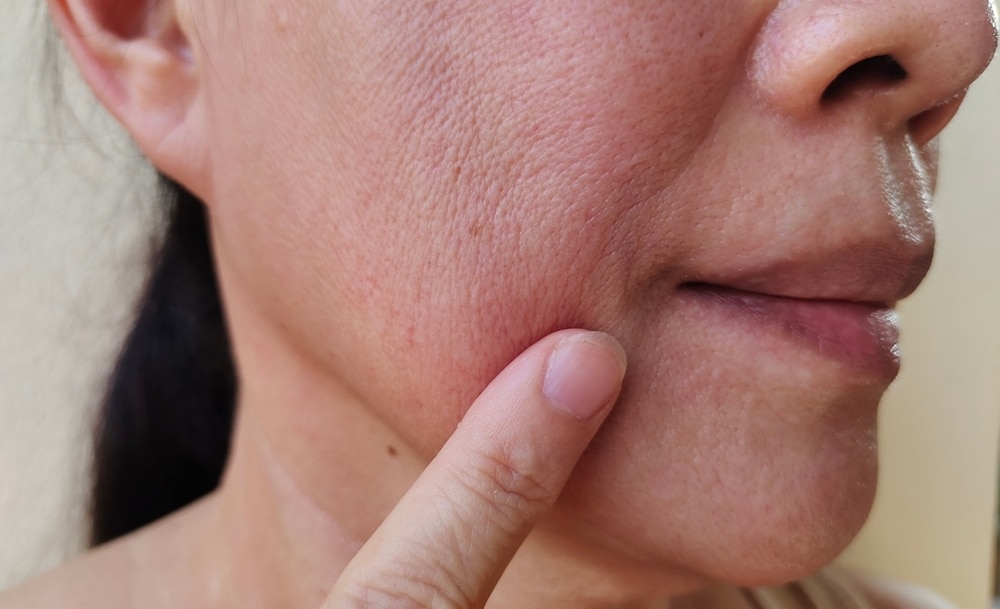If you have sensitive skin, you probably think twice about the products you choose to put on your face and body. After all, common signs of sensitive skin—like redness, itching, and irritation—can be frustrating and uncomfortable. Fortunately, understanding how to care for sensitive skin isn't as complicated as you might think. By getting to know your complexion and sticking to a few golden rules, clear, calm skin is within reach.
What Is Sensitive Skin?
According to survey results, 60 to 70 percent of women and 50 to 60 percent of men report having some degree of sensitive skin. But "sensitive skin" is more of a symptom than a diagnosis. Much like when you have a fever, there's usually an underlying cause.
Common skin conditions that can lead to reactive skin include eczema, atopic dermatitis, acne, rosacea, perioral dermatitis, sun damage, and aging. Sensitive skin can constitute redness, itching, inflammation, breakouts, flushing, and intolerability to previously tolerated products. It's important to find out what drives these issues to effectively treat sensitive skin.
What Should a Skin Care Routine for Sensitive Skin Look Like?
Sensitive skin is common, but that doesn't mean it isn't frustrating to deal with. Here are some basic, Dermatologist-approved skin care recommendations for how to care for sensitive skin.
Step 1: Cleanse
You encounter dirt, oil, pollutants, and other external irritants daily. Little particles settle on your skin as you leave your living space and enter the outdoors, even despite your best efforts. Using a gentle, pH-neutral cleanser to help remove these impurities without stripping essential oils and nutrients from the skin barrier is a key part of treating sensitive skin. Try a formula like EltaMD Skin Recovery Amino Acid Foaming Cleanser, which is gentle-yet-effective cleanser that includes a complex of 3 amino acids to help stregthen the skin. Avoid harsh products that leave your skin feeling tight, flaky, or dry.
Step 2: Avoid Irritants
Some people may benefit from popular products like exfoliants, scrubs, alpha-hydroxy and beta-hydroxy acids, and Retinoids, but they can irritate people with sensitive skin. This is where it's particularly important to identify the underlying cause of reactivity. For example, a Retinoid may help clear up acne but worsen rosacea or perioral dermatitis. Since all three of these conditions can result in breakouts (and all three have unique treatments), determining the underlying cause is essential.
Step 3: Moisturize
The skin barrier is the outermost skin layer that's responsible for keeping irritants out and moisture locked in. Both processes are essential to maintaining everyday skin health. Moisturizers—either in the form of lotions or creams—bolster barrier integrity and function. Lotions, which contain more water than oil, are a smart choice for hydrating oily skin. If you're on the dry side, choose a cream, as these are composed primarily of oil.
One way or another, keeping your skin barrier healthy through hydration is a key component of treating sensitive skin. Choose a product such as EltaMD AM Restore Moisturizer, which is noncomedogenic, fragrance-free, and hypoallergenic.
Step 4: Make SPF Your BFF
When building a skin care routine for sensitive skin, protection against ultraviolet (UV) light is another critical step. Anyone who's had a sunburn can personally attest to the damaging nature of UV rays.
Unprotected exposure to UV rays can lead to skin cancer, aging, fine lines, sunspots, uneven skin tone, flushing, and other changes. Most Derms recommend using a broad-spectrum SPF of 30 or higher daily and reapplying it every two hours, regardless of weather conditions or skin color.
Step 5: Seek Professional Care
Figuring out the underlying cause of sensitive skin can help you identify which products are appropriate for your complexion. In many instances, treating sensitive skin at home without professional guidance can exacerbate the issues, as allergies or potentially irritating ingredients may be part of the problem. A board-certified Derm can help you design a basic, protective skin care routine for your unique concerns, which is one of the best things you can do to treat sensitive skin.
